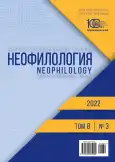Compound words in the work of the Swiss German-speaking author Urs Widmer “Hand und Fuß – ein Buch”
- Authors: Stikhina I.A.1
-
Affiliations:
- Ural State University of Economics
- Issue: Vol 8, No 3 (2022)
- Pages: 520-529
- Section: LANGUAGES OF PEOPLES OF FOREIGN COUNTRIES (GERMANIC LANGUAGES)
- URL: https://journal-vniispk.ru/2587-6953/article/view/301782
- DOI: https://doi.org/10.20310/2587-6953-2022-8-3-520-529
- ID: 301782
Cite item
Full Text
Abstract
The phenomenon of word composition in the German language is actualized: generally accepted classifications are given and problematic aspects are clarified. The purpose of the study is to consider the use of compound words in a chosen literary text and to define the artistic potential of this word formation. For this purpose, compound words in the text of the Swiss Germanspeaking writer Urs Widmer are analyzed and systematized in accordance with existing classifications. The methods used are analysis of theoretical approaches, linguistic analysis, methods of corpus linguistics and literary text interpretation. We found that besides complex definitive nouns prevailing in the text there are three-component compound words, compound adjectives and adverbs. A number of compound words used are not recorded in dictionaries, but they can be identified through their components and lexicalized in the language, which is proved by examples from electronic text corpora. As a result of the study, it is revealed that U. Widmer uses lexicalized compound words and creates occasionalisms, including for modeling the expressive mode of narration. The language game with compound words in puns forms the carnival discourse of the “inverted” language; moreover, the use of complex words also enables the author to create an ironic discourse. A compound word as an expressive language unit within the framework of the author’s individual style can be a promising topic for further research at the intersection of linguistics and literary criticism.
About the authors
I. A. Stikhina
Ural State University of Economics
Author for correspondence.
Email: aniris.irina@yandex.ru
ORCID iD: 0000-0002-1955-6549
Candidate of Philology, Associate Professor of Foreign Languages Department
62 8 Marta St., Yekaterinburg 620144, Russian FederationReferences
- Arzhantseva N.V. Slozhnyye slova so vtorym komponentom-otglagol’nym sushchestvitel’nym v nemetskom i angliyskom yazykakh i ikh sootvetstviya v russkom yazyke: avtoref. dis. … kand. filol. nauk [Compound Words with a Second Component-Verbal Noun in German and English and Their Correspondences in Russian: Author. Cand. philol. sci. diss. abstr.]. Kazan, 2004, 23 p. (In Russian).
- Fleischer W., Barz I. Wortbildung der deutschen Gegenwartssprache. 8. Auflage. Tübingen, Niemeyer Publ., 2012, 484 S. (In German).
- Eichinger L.M. Deutsche Wortbildung. Eine Einführung. Tübingen, Narr Publ., 2000, 269 S. (In German).
- Schlücker B. Die deutsche Kompositionsfreudigkeit. Übersicht und Einführung. Das Deutsche als kompositions-freudige Sprache. Strukturelle Eigenschaften und systembezogene Aspekte (Linguistik – Impulse & Tendenzen, 46, Band 46). Berlin, New York, De Gruyter Publ., 2012, S. 1-25. (In German).
- Motsch W. Deutsche Wortbildung in Grundzügen. Berlin, New York, De Gruyter Publ., 2004, 458 S. (In Ger-man).
- Meibauer J. Phrasenkomposita zwischen Wortsyntax und Lexikon. Zeitschrift für Sprachwissenschaft, 2003, Band 22, no. 2, S. 153-188. (In German).
- Gallmann P. Graphische Elemente der geschriebenen Sprache: Grundlagen für eine Reform der Orthographie. Tübingen, Niemeyer Publ., l985, 317 S. (In German).
- Substantivkomposition. Arbeitspapiere und Materialien zur deutschen Sprache. Herausgegeben vom Institut für Deutsche Sprache, 2004, Nummer 2/04, Juni, 85 S. (In German).
- Kürschner W. Zur syntaktischen Beschreibung deutscher Nominalkomposita. Tübingen, 1974, S. 32-38. (In German).
- Mugdan J. Grammatik im Wörterbuch: Wortbildung. Germanistische Linguistik 1-3, 1983, S. 237-308. (In Ge-rman).
- Stikhina I.A. Postmodernistskiye markery idiostilya Ursa Vidmera [Postmodernist markers of Urs Widmer’s idiostyle]. Filologicheskiye nauki. Voprosy teorii i praktiki – Philology. Theory & Practice, 2018, no. 6-2 (84), pp. 296-299. (In Russian).
- Stikhina I.A. Sravnitel’nyye frazeologizmy: osobennosti subklassa (na primere nemetskogo yazyka) [Compara-tive phraseological units: features of the subclass (by an example of the German language)]. Vestnik Samarskogo universiteta. Istoriya, pedagogika, filologiya – Vestnik of Samara University. History, Pedagogics, Philology, 2021, vol. 27, no. 4, pp. 139-151. (In Russian).
- Oleynik O.V. Slova-kompozity v nemetskoy presse [Composite words In German press]. Mezhdunarodnyy nauchno-issledovatel’skiy zhurnal – International Research Journal, 2020, no. 7 (97), pt 3, pp. 92-95. https://doi.org/10.23670/IRJ.2020.97.7.087 (In Russian).
- Pervak T.V. Yazykovaya igra v telediskurs: leksicheskiy i stilisticheskiy aspekty (na materiale nemetskogo komediynogo teleseriala «Shtromberg»): avtoref. dis. … kand. filol. nauk [Language Game in Television Discourse: Lexical and Stylistic Aspects (on the Material of the German Comedy Television Series”Stromberg”). Cand. philol. sci. diss. abst.]. Mytishchi, 2018, 26 p. (In Russian).
Supplementary files









